Leeds Music History
We dive into the colourful music history of the city of Leeds…
Leeds has a diverse musical history and, while perhaps not as celebrated as Manchester or Liverpool, is equally rich with talent, artists and amazing music.
The city's music scene has evolved and experienced different exciting periods, musical styles and sounds over the years.
As ICMP looks to launch its undergraduate music courses in Leeds in September 2025, we explore many of the most important moments in the city's musical timeline...
1800s/1900s | The first live music venues
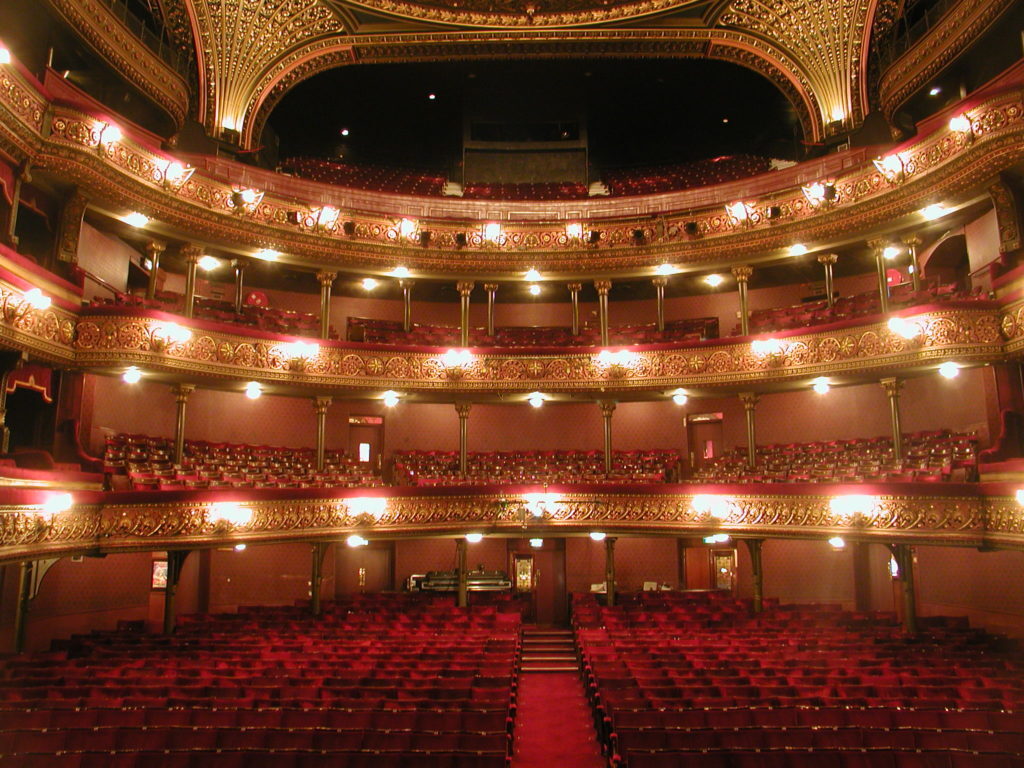
During the 1800s, as in so many towns across the UK, the main form of live entertainment came via the music hall.
The Grand Theatre, dubbed 'the Grand Old Lady of Leeds' (pictured above c/o Visit Leeds), first opened its doors in 1878 while the City Varieties Music Hall was initially a room above a pub and opened around the same time.
As we've already seen, Leeds has a brilliant array of venues of all sizes to cater for established and emerging bands and artists.
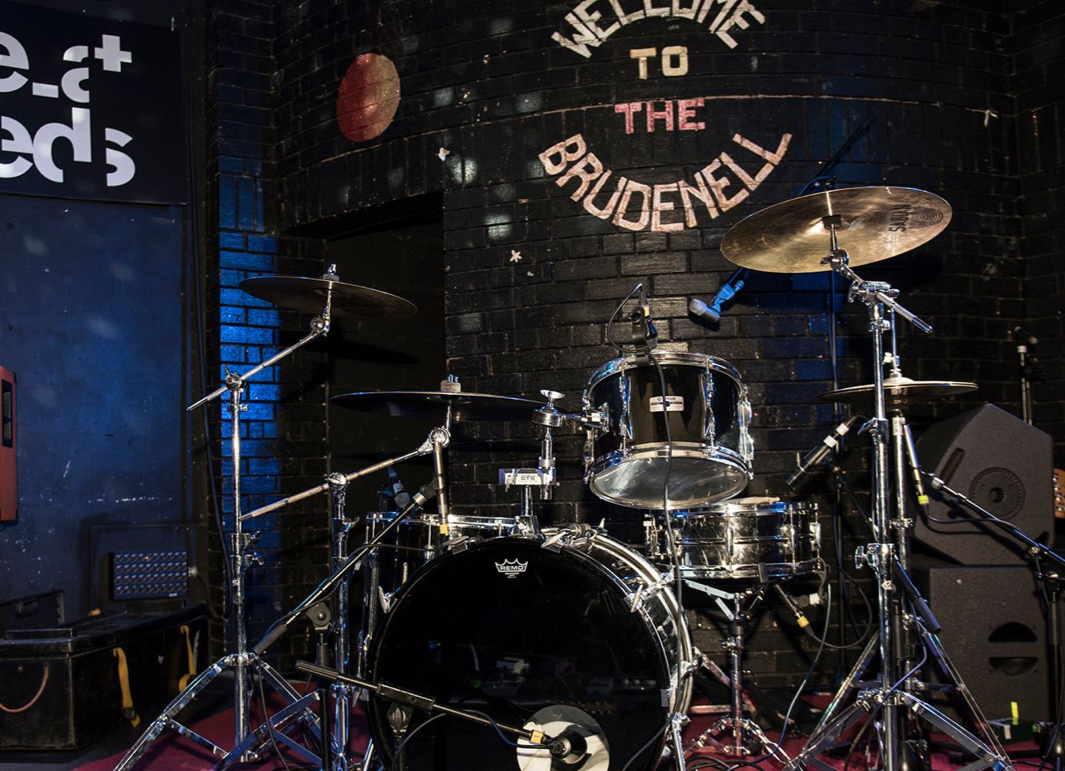
The Brudenell Social Club is perhaps the most legendary, having been at the centre of Leeds' music scene for more than 100 years. It's at the root of the city's musical landscape and a conduit through which much of the best local talent flows.
Over the decades, it has hosted musical legends from Franz Ferdinand and local heroes the Cribs to singer Tom Jones and continues to be a regular fixture on the gigging circuit for acts of all kinds.
The Fifties | Jazz scene and early pop music
In the 1950s, jazz was one of the most popular sounds in Leeds with different songwriters, artists and performers associated with the city and venues including the former Peel Hotel on Boar Lane. Studio 20, on Upper Briggate, now called Sela Bar was also popular and run by Bob Barclay, leader of the Yorkshire Jazz Band.
In an interview with the Yorkshire Post, Michael Meadowcroft, a former MP and jazz musician, said: "There was a real enthusiasm for jazz, and lots of little clubs started popping up everywhere. Leeds had a great jazz scene in those days, you could go to a different club every night of the week."
Although born in Hull, singer Ronnie Hilton made a name for himself in Leeds during the 1950s and was most famous for his hit, 'A Windmill in Old Amsterdam'.
The track spent thirteen weeks in the UK singles charts in 1965. In his Guardian obituary, the newspaper said: "For a time Hilton was a star - strictly for home consumption - with nine top 20 hits between 1954 and 1957, that transitional era between 78 and 45rpm records."
Marion Ryan was another vocalist who achieved success in Leeds, memorably described as "the Marilyn Monroe of popular song".
Her top twenty hits included 'Hot Diggity' while she also made recording history by singing on the UK's first ever stereo single, 'The World Goes Round and Around'.
1960s | Freakbeat, dub and carnival culture
Of course, the UK's music scene in the sixties was dominated by the Beatles and the new rock and roll sound. However, at the same time, there were other groups and artists making their own melodic noise across the country, including Leeds too.
Several bands made an impact during this period such as The Cresters.
Originally put together as a backing group for singer Mike Sagar, the group performed and released music from the sixties to the eighties, even supporting the Beatles on tour.
The Outer Limits were another Leeds guitar outfit who enjoyed some success in this period, a group inspired by the skiffle scene of the 1950s.
The band played alongside almost all the big sixties acts, including the famous 1967 tour with Jimi Hendrix and Pink Floyd, before their disintegration was captured in the television documentary 'Death of a Pop Group' in 1969.
While these guitar bands were sharpening their performance and songwriting skills, dub, reggae and sound system culture was also increasing in volume, particularly in light of the Windrush generation and this new population of Jamaica and Caribbean people who came to the UK to help rebuild infrastructure in the wake of the Second World War.
Different towns across the North of England including Huddersfield and Sheffield as well as Leeds saw a new diversity in their populations.
This influenced local music scenes too, with the first Leeds West Indian Carnival taking place in 1967 as an acknowledgment and celebration of traditional Caribbean music.
The Seventies | The punk and post-punk movement
Leeds hosted the second Rock Against Racism (aka, RAR) gig in 1977 as part of a campaign based around live music aimed at combating racism in 1970s Britain.
Numerous influential punk bands with a political leaning were formed in Leeds around the same time, including Gang of Four.
Gang of Four
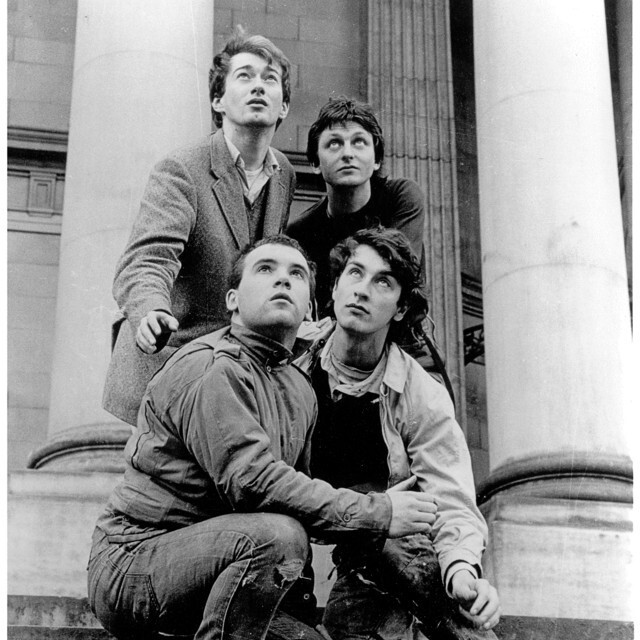
The group met at university at Leeds during the mid-seventies, and became a politically-charged post punk band, drawing on elements of dub, reggae and guitar music to forge their riotous sound.
With an original line up (pictured above c/o Andy Gill's website) including singer Jon King and guitarist Andy Gill , the group's 1979 debut album, 'Entertainment', was hailed as one of the best debut albums of a guitar band of the time, featuring seminal tracks including 'Damaged Goods' and 'At Home, He's a Tourist'.
Delta 5
The Delta 5 were an influential bass guitar driven, three girl/two boy outfit from Leeds who managed to dismantle the conventions of guitar rock and instead come up with a new pop blueprint that still resonates to this day.
In October 1979, they debuted with the single 'Mind Your Own Business' before releasing their influential debut album, 'See the Whirl', two years later.
The Mekons
Formed in Leeds in 1977, punk outfit the Mekons blazed a unique trail through various musical styles, scenes and sounds.
Blurring the lines between punk, funk and country music, the group's prolific output is born out of a righteous anti-establishment political outlook. 'Never Been in a Riot', a track released as a response to 'White Riot' by The Clash set the tone for their anarchic take, with more than 20 albums now to their name.
The musical story of this vibrant period has been captured in a boxset released by Cherry Red Records entitled : 'Where Were You?: Independent Music from Leeds 1978-89'.
Another big moment in the city at the start of the seventies was the release of The Who's 'Live at Leeds' live album.
This iconic recording of the band, featuring vocalist Roger Daltrey and guitarist Pete Townsend, was captured with the rockers in full pelt at the Refectory at the University of Leeds.
The Eighties | Synth pop and goth
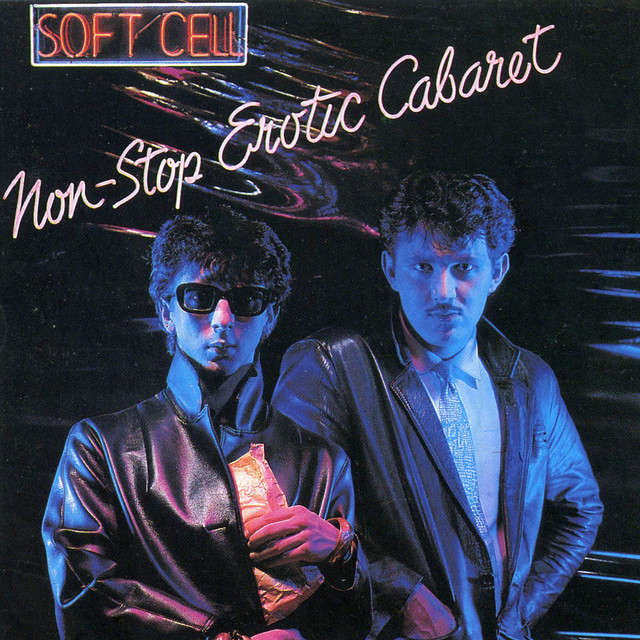
Synth pop is a sound synonymous with the eighties and Soft Cell, a duo consisting of Dave Ball and vocalist Marc Almond, are considered some of the early pioneers of this sound.
Their debut album - 'Non Stop Erotic Cabaret' - released in 1981 features some of the band's most iconic tracks including their cover version of Gloria Jones' 'Tainted Love', which topped the charts worldwide and became the second best-selling British single of 1981.
The album featured two hit singles including the magnificent 'Say Hello, Wave Goodbye'.
While Soft Cell's sound had one foot in the New Romantic scene popularised by Duran Duran and Spandau Ballet, they were also part of the infamous goth scene which saw Leeds bands such as the Mission and Sisters of Mercy establish themselves.
Le Phonographique is thought to be the world's first goth club, located in the Merrion Centre. It was here where the post-punk and New Romantic scenes collided with Soft Cell's Marc Almond among the DJs.
Sisters of Mercy were one of the most successful of the goth acts to emerge from Leeds during the eighties. Formed by main creative Andrew Eldritch in 1980, they enjoyed some commercial success before halting the release of new music in protest against their record label.
The Nineties | House music, Britpop and a Spice Girl
The nineties was a decade of huge cultural change and Leeds was at the heart of much of it, with influential bands, songwriters and club nights all coming together and exploding with creativity.
Acid house kick-started the decade and the city was the base for many of the UK's greatest clubs including Back to Basics.
Lorded over by impresario Dave Beer, the night continues to pop some 30+ years later, marauding through various venues with residents including Ralph Lawson.
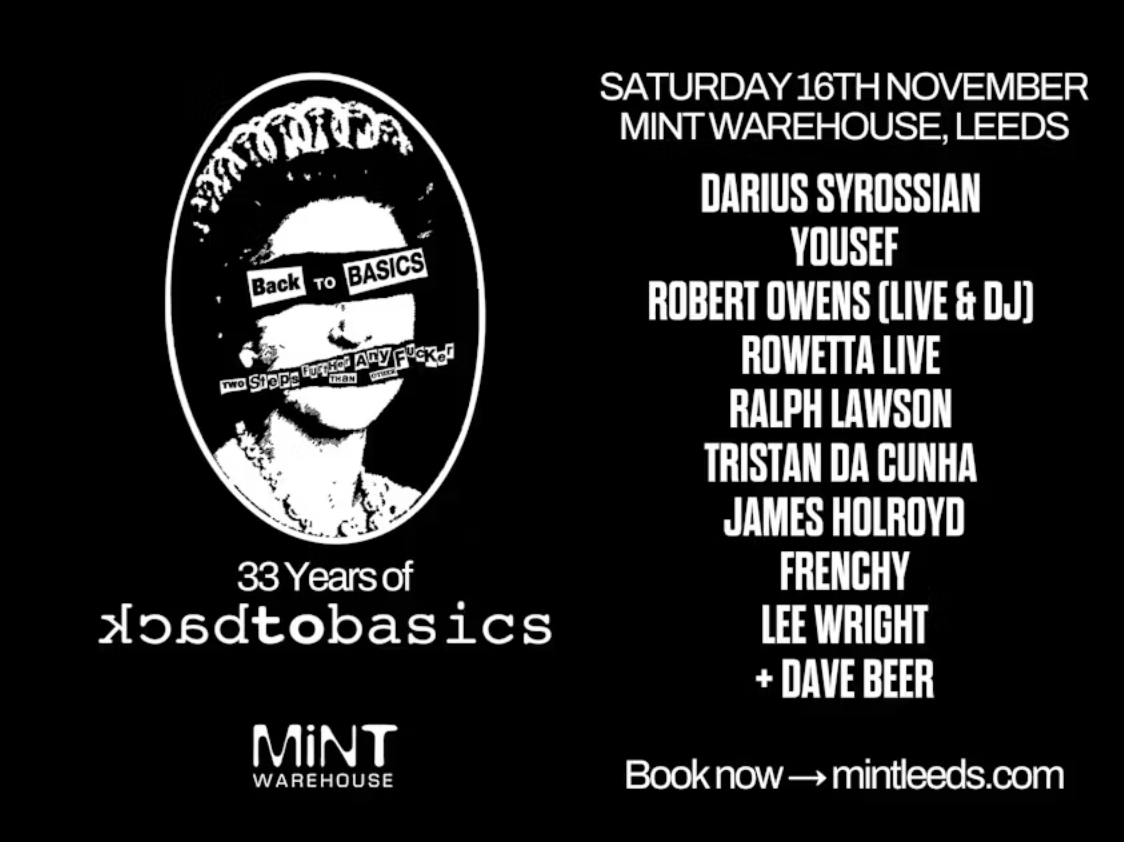
Although formed in nearby Harrogate in 1991, Utah Saints were based in Leeds and heavily influenced by the sound of the Prodigy and the rave and hardcore scene of the time.
Throughout the nineties they had three top ten singles and another five in the top 40, including the brilliant 'Something Good'.
In the clubs, sound system culture also took off with the Iration Steppas collective, led by DJ Mark Iration, born at the end of the eighties/start of the nineties via their infamous SubDub nights at the Leeds West Indian Community Centre.
During the early 1990s, Iration Steppas was officially launched as a sound system, issuing powerful and futuristic dub productions.
Their bass-heavy sets are loved for their volume and sound system weight, having literally shaken buildings and ceilings via their sets.
Warp Records, the electronic label, also came to life between Sheffield and Leeds during the end of the eighties/start of the nineties.
In Sheffield, it was the Forgemasters who released the iconic, 'Track With No Name' while it was Leeds-born Ibiza based producer George Evelyn who represented West Yorkshire, releasing music under the name of Nightmares on Wax.
His debut album, 'A Word of Science: The First and Final Chapter', emerged in 1991 while his 1995's 'Smokers Delight' defined a new genre in the form of downtempo, a sonic palette drawing on funk, soul, hip hop and ambient sounds.
In the charts, two different worlds collided, demonstrating the cultural craziness of the decade. The Leeds-born Mel B from the Spice Girls became a huge star in the mid-nineties with the girl group's hit 'Wannabe'. On the flip side, the anarchic Chumbawamba released 'Tubthumping' in 1997, a song that became a number two hit that took them to mainstream success.
The first ever Leeds Festival was also held at the end of the nineties, a date in the diary and right of passage for all those young music fans finishing their A-Levels and GCSEs.
Over 20 years later, the festival continues to be paired with its sister event, Reading Festival, signaling the end of summer and start of autumn.
2000s | Indie success stories
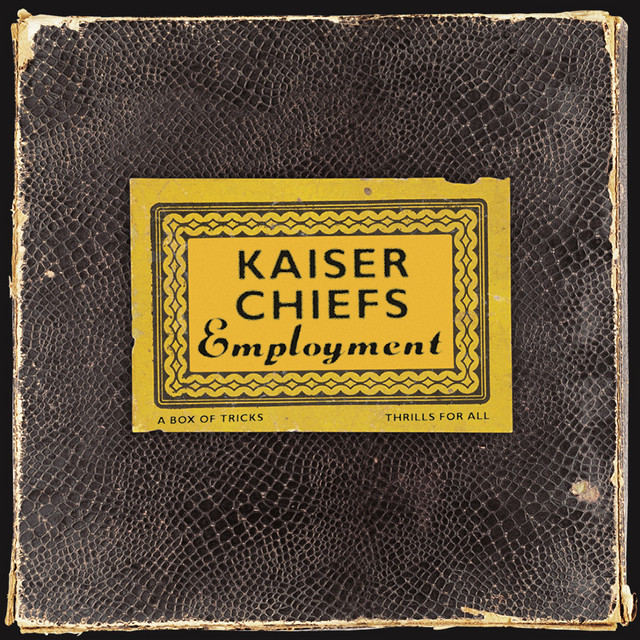
In the 2000s, Leeds is perhaps best known for its indie guitar success stories with the Kaiser Chiefs one of the most well known groups.
Formed from the ashes of previous band Parva, they broke through in 2005 with the release of their debut album, 'Employment' and its hit singles, 'Oh My God', 'I Predict a Riot' and 'Ruby'.
With Ricky Wilson enjoying a stint on 'The Voice' as a judge, the band are now on their eighth album and performing a huge anniversary gig in Leeds during the summer of 2025.
The Cribs, an indie band led by twin brothers Gary and Ryan Jarman and their younger brother Ross Jarman, were from nearby Wakefield but another enduring guitar success story.
They burst into the music scene during the early 2000s and were initially likened to the Libertines in part due to their chaotic live gigs and appetite for destruction when on stage. They have continued to write, record and release music alongside touring.
Indie outfit alt-J also formed in Leeds in 2007 featuring the musical skills of Joe Newman, Thom Sonny Green, and Gus Unger-Hamilton. Their debut album, 2012's 'An Awesome Wave', made them indie stars and led to the band winning the Mercury Prize in the same year.
The band's sound has continued to evolve, taking in more electronic textures and incorporating bigger themes with latest record, 'The Dream', released to critical acclaim in 2022.
Singer songwriter Corinne Bailey Rae is another notable success story from the 2000s.
Born in Leeds, she rose to prominence with her hit single, 'Put Your Records On', a hit track released in 2006. Shortly after, she became the fourth female British act in history to have her eponymous debut album reach the top of the charts.
The album led to BRIT nominations, Grammy and MOBO awards while she has continued to write and record. Her latest album, 'Black Rainbows', was released in 2023 and received a nomination for the Mercury Prize, an accolade that was won by fellow Leeds band, English Teacher.
Bailey Rae's fourth album, the record marked a drastic change of musical direction, taking in punk, electronic and noise sounds, starkly contrasting with her earlier folkier material.
Today's Leeds music scene
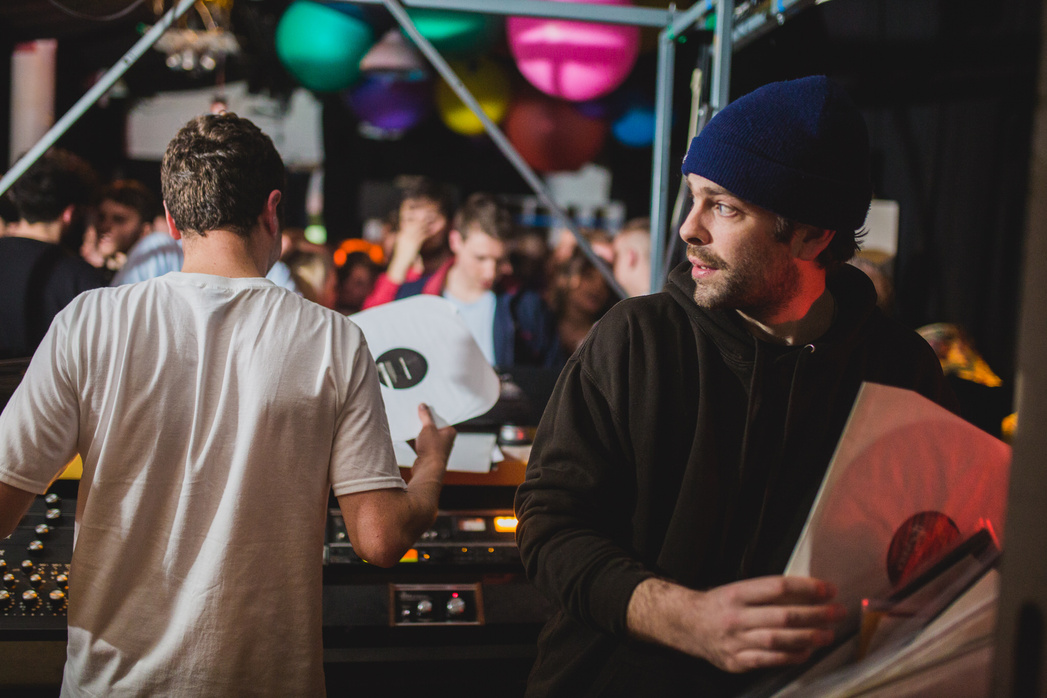
In our current decade, Leeds' music scene is more fertile than ever.
There's now a strong grassroots scene of collectives including Damaged Goods, Cosmic Slop (pictured above c/o Cosmic Slop website) and Sable Radio that are, as described by BBC 6 Music's Emily Pilbeam as, "creative organisations to look out for, as they are 'proudly independent and radically diverse in style, yet invaluable operations that are consistently pushing the envelope'".
Perhaps the most vital band to recently emerge from Leeds are English Teacher, a guitar-based band led by front woman and vocalist Lily Fontaine.
The group unveiled their debut album, 'This Could Be Texas', in April 2024 and were announced as winners of the Mercury Prize in September.
Take the first steps in your music career with ICMP
We've been developing and delivering contemporary music education for over 30 years – longer than any other music school in the UK. With a proven track-record, countless music industry connections and unrivalled access to facilities, it's easy to see why hundreds of students choose ICMP each year.
To completely immerse yourself in your music career, chat with our friendly Admissions Team via email enquiries@icmp.ac.uk or give them a call on 020 7328 0222.
Find your course
We've been developing and delivering contemporary music education for over 30 years – longer than any other music school in the UK. With a proven track-record, countless music industry connections and unrivalled access to facilities, it's easy to see why hundreds of students choose ICMP each year.
To completely immerse yourself in your music career, chat with our friendly Admissions Team via email enquiries@icmp.ac.uk or give them a call on 020 7328 0222.




